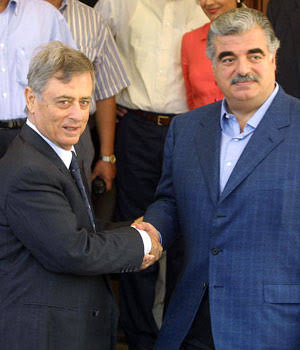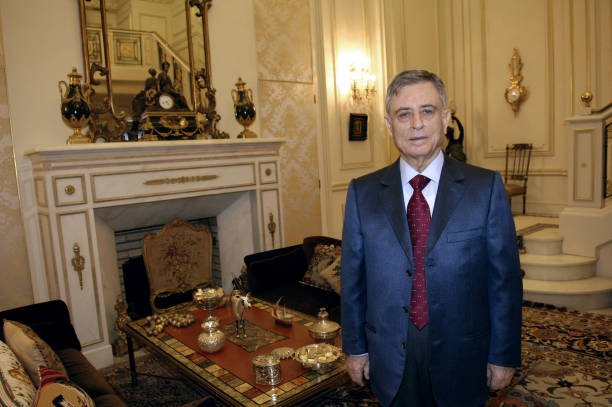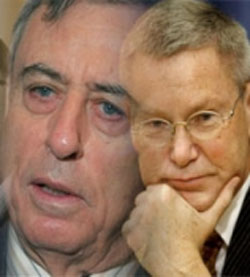Former Syrian Vice President Abdul Halim Khaddam revealed yesterday that he met the head of the international investigation committee into the assassination of the late President Rafik Hariri, Judge Detlev Mehlis, in Paris the day before yesterday. He spoke to him about “specific facts evaluated by the committee,” emphasizing that he is seeking a Syrian national alliance to overthrow President Bashar al-Assad, expressing his support for the “Damascus Declaration.” Meanwhile, the “Muslim Brotherhood” expressed their readiness to work with Khaddam during the transitional period to “change the Syrian regime.”
Khaddam, who resides in Paris under security protection, told Agence France-Presse that he met German Judge Detlev Mehlis on Friday afternoon in the French capital.
He explained, “Mehlis asked me several questions about the assassination of Mr. Rafik Hariri, and I answered him based on the information I have. Of course, the investigation committee works secretly, and it is not my right to disclose what I said.” He added, “I provided specific facts, and the assessment of these facts lies with the committee.”
Khaddam said, “The assassination operation requires complex arrangements, whether in terms of materials used or the elements required for the operation.” He added, “No security apparatus can make such a decision, even if someone wanted to carry it out alone. The information will reach the president because everyone monitors each other, and thus, if there is involvement of a Syrian security apparatus, it is by the decision of the head of state.”
Khaddam wondered, “Is the Syrian regime involved? This is what the investigation committee will prove.”
He confirmed that “reading Judge Mehlis’ report clearly shows that the committee has specific evidence, but it did not provide specific names. I believe, as they said in the report, that the reason for this is to ensure the safety of the investigation, as the Security Council is not a judicial council but a political council, and it is the one that formed the committee.”
Khaddam clarified that he would have been killed if he had made his statements within Damascus, considering that the accountability of the Syrian regime has begun, and he wished for its overthrow through a popular uprising. In an interview with “United Press International” yesterday, Khaddam announced that he is seeking to “establish a national alliance in Syria to overthrow President Bashar al-Assad and hold accountable those he described as security personnel,” denying any alliance with former Chief of Staff Hikmat Al-Shihabi, who resides in the United States.
Khaddam said, “I am not forming an alliance with Hikmat Al-Shihabi, but I am working to establish a national alliance in Syria. I am not seeking anything personal or personal ambitions. I am working to overthrow Bashar al-Assad and to hold accountable the security personnel who negatively involved with the Syrian citizens. I have nothing to hide or fear.”
Khaddam appeared keen to deny any connection with any Syrian official residing outside Syria, noting that he “has no connection with former Syrian Vice President Rifaat Al-Assad (who resides in France), neither closely nor remotely… I am not seeking to meet Ziad or Amr.”
In response to a question about the nature of the new system he envisions for Syria, Khaddam answered, “In the 1950s, Syria was a democratic country. Democratic Syria halted the Baghdad Pact. Democratic Syria used to send cadres to most Arab countries.”
Khaddam expressed his support for what is known as the “Damascus Declaration,” issued on October 16th last year by 12 political parties in addition to a number of Syrian opposition figures calling for a “radical democratic change in Syria.” Khaddam said, “This declaration expresses the aspirations of the Syrians well. I support this declaration, and its content aligns completely with my perspective.”
After praising French President Jacques Chirac and describing his policy towards Syria and Lebanon as “appropriate,” he placed the responsibility for the deterioration of relations between Paris and Damascus on Assad and his associates. Khaddam denied having any contact with US officials, whether initiated by him or by them.
Regarding the possibility of normalizing the strained relations between Lebanon and Syria, Khaddam said, “It’s not possible to convince a team of Lebanese to do so before the investigation into Hariri’s assassination is completed.”
Khaddam warned against tampering with the Taif Agreement, considering that doing so “would lead Lebanon back to square one,” which means the outbreak of a new civil war.
Responding to his comment on Chirac’s statement that he does not use Khaddam’s words to overthrow the Syrian regime, Khaddam said, “His words are correct. Indeed, what I say has no connection, and he does not use what I say to overthrow the regime in Syria. He did not say he is working to overthrow the regime in Syria.”
He saw that the reason for the deterioration of relations between Damascus and Paris is due to “the incorrect reading and wrong decisions made by Bashar al-Assad. The Syrian people wanted the Syrian army to withdraw from Lebanon since 2000,” when Israeli forces withdrew from southern Lebanon.
In another statement to the private radio station “RTÉ,” Khaddam said, “President Bashar al-Assad threatened Rafik Hariri on several occasions. I know this because I heard Bashar al-Assad myself. However, assessing the significance of these threats and whether Bashar al-Assad was involved or not involved (in Hariri’s assassination) is up to the investigators.”
Khaddam spoke in detail about these threats. He said, “One day, Bashar summoned Rafik Hariri in the presence of security officers and directed harsh words at him, accusing him of working against Syria and striving to elect a Lebanese president who is hostile to Syria.” Khaddam added that the Syrian President “said, ‘I am the one who decides, and anyone who opposes my decisions will be eliminated.'”



